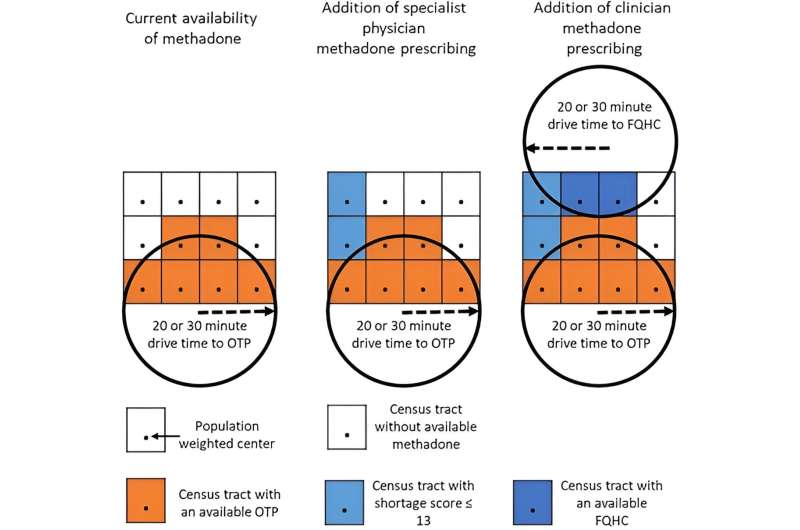This article has been reviewed according to Science X's editorial process and policies. Editors have highlighted the following attributes while ensuring the content's credibility:
fact-checked
trusted source
proofread
Study: Proposed law would expand methadone access, but gaps would remain

The federal Modernizing Opioid Treatment Act, or MOTA, would expand methadone access to an additional 14% of census tracts in the U.S., according to new research from the University of Pittsburgh published recently in Health Affairs Scholar.
The proposed law would change not only who can prescribe methadone, but also where it can be dispensed. Currently, only clinicians at federally certified opioid treatment programs can prescribe and dispense the drug for opioid use disorder, which studies have shown is one of the most effective treatments for the condition.
Often, a patient must visit a clinic each day to receive their dose. Under MOTA, any addiction medicine physician or psychiatrist could prescribe the drug, and it would be available at pharmacies in addition to certified clinics. Because of the limited number of addiction specialist physicians in the U.S., researchers examined if broader prescribing privileges, including prescribing by primary care clinicians, may be necessary to meet the scale of the overdose epidemic.
"The regulations around methadone create substantial barriers for people suffering from opioid use disorder," said lead author Paul Joudrey, M.D., M.P.H., assistant professor in the Division of General Internal Medicine at the Pitt School of Medicine. "The lack of access disproportionately affects people in rural and suburban areas, which are less likely to have methadone treatment available under current law."
Methadone is available in 49% of U.S. census tracts; for suburban and rural tracts, the rates drop to 34% and 10%, respectively. The findings show that MOTA would expand availability to an additional 18% of suburban and 15% of rural census tracts, potentially preventing thousands of opioid overdose deaths each year.
However, since many areas would still lack access to methadone treatment under the proposed change, the study also examined a third scenario, wherein any clinician with prescribing privileges, including primary care physicians, could prescribe methadone for opioid use disorder treatment. In that case, access would expand to 86% of total tracts, including 87% of suburban tracts and 68% of rural tracts.
"While proposed changes to federal law would certainly make methadone more accessible to many people with opioid use disorder, they fall short of ensuring the availability of treatment to all Americans at risk of overdose death. Rural communities are mostly likely to be left out of the benefits of MOTA," said Joudrey.
More information: Paul J Joudrey et al, Methadone prescribing by addiction specialists likely to leave communities without available methadone treatment, Health Affairs Scholar (2023). DOI: 10.1093/haschl/qxad061



















